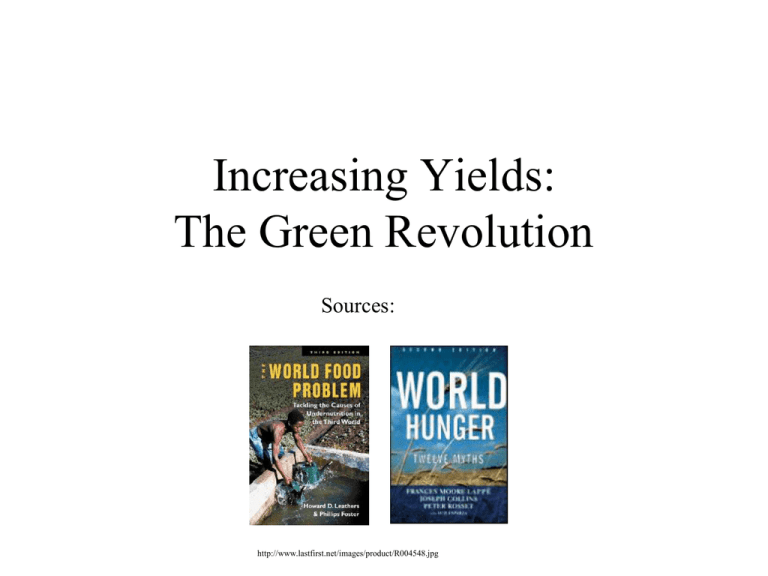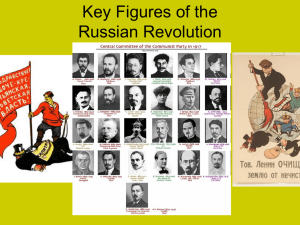Increasing Yields: The Green Revolution Sources:
advertisement

Increasing Yields: The Green Revolution Sources: http://www.lastfirst.net/images/product/R004548.jpg Yields have increased • British wheat yields tripled in last 50 years – 15X increase from 500 years ago • Cereal yield worldwide doubled since 1960s http://www.essentialoil.in/images/wheat.jpg Reasons Yields Increase • Increased inputs – Labor – Fertilizer – Machinery • increased output – Using technology – without increasing inputs • Increased efficiency http://cache.eb.com/eb/image?id=102482&rendTypeId=4 Production Function • Initially, as input increases, output increases • Eventually, a point of maximum efficiency will be reached • Additional input will lead to diminished increases in output http://450.aers.psu.edu/images/technical_efficiency.gif Inputs • Fertilizer – Can improve yields dramatically: 20-1000% – Diminished response if keep adding – Reduces growth at high levels – Effectiveness depends on • Water/Irrigation • Timing of application – Biggest increase will be in Africa • Dem. Rep. Congo uses 1% Cassava in Gambia http://www.reap-canada.com/images/international_38.gif fertilizer used in South Africa Fertilizer use Inputs • Animal Traction – 400 million draft animals in world – ½ World’s ag land farmed with draft animals – ¼ farmed with hand tools – ¼ mechanized China http://afe.easia.columbia.edu/china/geog/RicePlowing.gif Use of Draft Animals • Do the work of 3-4 • • • • humans Increase land able to be farmed Animal plowing breaks soil better than by hand Source of fertilizer Initial cost high – Profitable if can expand land Vietnam http://www.sdcoe.k12.ca.us/score/lotus/mplowing.jpg Tractors • Poorest farmers will consider moving from hand tools to animals • Farmers using animals will consider using machinery • May not be efficient choice: Zimbabwe – – – – Credit limited Gas expensive Maintenance expensive But labor cheap Small farms more efficient • Small farmers use labor more intensively • Small farmers use space more efficiently • Small landowners more motivated for production and conservation Tanzania Big growers less efficient • Big growers are less efficient than small growers – in yield/acre • Big operations are fossil fuel intensive – requiring 10 Calories for every one produced: • NeoCaloric Ag Big Growers in Brazil • Land ownership is inequitable – 2/3 of land owned by 3% of population – 60% of farmland is left idle – 4.8 million rural families are landless Brazil Farm Big Growers • Advantages of wealth, size – Big farms can more easily survive • Bad years • Market swings • Large operations with absentee owners (investors) tend to: – Overuse the soil – Over-spray with chemicals – Remove wealth generated from the community http://www.pnwwaterweb.com/images/sprayer.jpg Land Reform • World Bank: – productivity would be increased if land distribution more equitable • Land reform (redistribution) successful after WWII: – South Korea, – Taiwan – China • Recent success Kerala, India http://www.freewebs.com/lindartw/INtamil17.JPG – Japan – Zimbabwe – Kerala, India Green Revolution • 1960’s: improved wheat Wheat improvement http://www.cgiar.org/images/may2006_3.gif varieties gave dramatic increase in yield in Mexico • Varieties more responsive to irrigation and petrochemical fertilizers • Soon new rice and maize varieties Norman Borlaug • Joined Rockefeller Foundation team in Mexico 1944 • Increased yield, rust resistance in wheat • Biggest contributor to Green Revolution • Won Nobel Peace Prize in 1970 http://www.dailygalaxy.com/photos/uncategorized/2007/ 07/17/norman_borlaug.jpg Green Revolution • 1970’s: spread to millions of third world farmers • 1990’s: 40% of all farms in third world – 75% Rice in Asia – 80% Wheat in third world – 70% Corn worldwide India http://cache.daylife.com/imageserve/0fVs96B7mQe3a/610x.jpg • Increased yields 250% • Improved standard of living for millions people worldwide CIMMYT • CIMMYT – International Maize and Wheat Improvement Center – In Mexico • Part of CGIAR CIMMYT, Mexico http://nue.okstate.edu/Picture_2.jpg – Consultative Group on International Agricultural Research Criticisms of the Green Revolution • Green Revolution hasn’t alleviated hunger • Economic power, land controlled by few • Technology benefits wealthy • Therefore Green Revolution increases inequity – More hunger AND more food at same time Criticisms of the Green Revolution • Food Insecurity of poor not Zambia http://www.chinese-embassy.org.uk/eng/zt/Features/W020060929647944067705.jpg addressed • Cash Crops: food flows from the poor and hungry nations to the rich and well-fed nations • Green Revolution not sustainable – destroys resource base on which agriculture depends Example: India • Self-sufficient in grain due to Green Revolution • But 1/3 of people poor • 5,000 children die each day • Poor cannot afford to BUY the food India http://cache.daylife.com/imageserve/0fcb0nk3Wwarf/610x.jpg Criticisms of the Green Revolution • Early, poor had little access to credit • Could not buy seeds, fertilizer, irrigation to make Green Revolution work • Wealthy invested, got richer, drove out poor • Now, more emphasis on loans for poor Irrigation in Punjab, India http://kesa.in/irg3a.jpg There are still problems • Need good land (wealthy own) • Agrochemicals bad for health, • • • • Planting rice, India environment Expensive inputs: profits to global chemical companies Rural people displaced from land Mechanization reduces agricultural jobs Not ecologically sustainable: depletes soil, pesticide race http://frank.itlab.us/India_2002/dec_25_planting_rice.jpg Philippines Example • Two villages studied: – large and small farmers invested in Green Revolution • Village 1 had more equal land holdings, solidarity – All benefited from Green Revolution • Village 2 dominated by a few wealthy landowners. – Wealthy increased land by 50% at expense of poor http://i.pbase.com/g6/09/610009/2/85229411.jw5eMGu6.jpg Farm Squeeze • Fertilizer use increases by huge amount • Yields do not increase proportionally • India: 6x rise in fertilizer use – but 2/3 less production/ton of fertilizer • Need more fertilizer, pesticide each year for same result • Thus cost go up faster than yields: cost-price squeeze Farm Squeeze • U.S. true home of Green Revolution • Yields up 3x – but prices down • To survive, must expand acreage – to make up for lower per acre profit. http://www.ncccusa.org/gifs/Farming.jpg U.S. Farm Squeeze • Since WWII – – – – http://www.mamalisa.com/images/blog/cornfarm.jpg number of farms decreased 2/3 average farm size up ½ rural communities gutted production costs up from 50% of gross to 80% Soil Depletion Worldwide • Dramatic increases in yields during 1970s, 1980s • Soil now depleted, resulting in leveling off or dropping yields • 6% of Ag land in India now useless http://www.globalchange.umich.edu/globalchange2/current/lectures/land_deg/concern.gif International Rice Research Institute (IRRI) Phillippines http://cropwiki.irri.org/icis/images/thumb/b/bc/IRRI.gif/350px-IRRI.gif Rice Problem • 1968: IR8 rice had 2x yield increase – Short • need herbicides to compete with weeds – Uniform genetically • susceptible to pests – Brown plant hopper devastated rice – Insecticide spraying useless • brown hopper resistant http://farm3.static.flickr.com/2300/2198720003_4242e01d24.jpg?v=0 Rice Problem • 1973: IR26 Resistant to brown plant hopper – Worked 2 years – Then Biotype 2 of plant hoppers attacked http://www.knowledgebank.irri.org/RiceDoctor/Fact_Sheets/image5.jpg Rice Problem • 1975: IR32 Resistant to Biotype 2 – Now Biotype 3 appeared – Insecticides again useless – Insecticides killed off brown hopper predators – Resulted in 40x increase in hoppers http://farm1.static.flickr.com/175/367777228_e90badf1da.jpg?v=0 Profits • Profits from Green Revolution go to – – – – Middlemen Banks Chemical companies Biggest growers • Grain prices fall • Farms get bigger Brazil http://assets.panda.org/img/59894_amazon_agriculture2_50779.jpg Increased Dependency • Poor countries must import: – – – – Seeds Fertilizer Pesticides Herbicides • Cost to India increased 600% 1960-1980 • Biotechnology leads to more dependency Unsustainable Agriculture • Industrial agriculture = – mining land to extract maximum output • “War” between humans and weeds, insects and disease • Market dictates weapons: – pesticides and chemical fertilizers • We are destroying our foodproducing resources http://progressivegardening.com/ProgressiveGardeningImages/PesticideMixing250.jpg Destruction of Ag Resources • • • • • • • Desertification Soil erosion Pesticide contamination Groundwater depletion Salinization Urban sprawl Genetic resources shrinking • Fossil fuels depleting http://upload.wikimedia.org/wikipedia/commons/thumb/7/7b/Erosion.jpg/397 px-Erosion.jpg Sustainable Agriculture Goals • Environmental Health • Economic Profitability • Social and Economic Equity http://www.cias.wisc.edu/curriculum/images/imagesclip_image002.jpg http://www.newfarm.org/international/features/2007/0907/burkinafaso/i mages/sawadogo.jpg Agroecology • Sustainable farming based on ecological principles: – – – – Diversity Interdependence Synergy Complex interactions • Science to improve not displace traditional farming • Low energy, capital costs http://herbnerds.com/images/deb.jpg Agroecology • Intercropping – Mixing annual and perennial crops • Crop rotations – Rotate cereals and legumes • Mixing of plant and animal production – Rice paddies with edible weeds, fish and rice • Not continuous production of one crop Intercropping, Senegal http://www.bioking.nl/jatropha/Intercropping.jpg Africa • Fragile soils must be protected • Could mix millet, cattle, and • • • • • Acacia trees Trees fix nitrogen, have deep tap roots Cattle eat tree pods Plant millet after leaves fall Could support 2x population in Senegal Aid agencies instead promoting new seeds, fertilizers, agrochemicals, biotechnology, free trade Evergreen Revolution • Swaminathan led Green Revolution in India • Agrees cannot maintain crop yields • Problems: – – – – Excessive use of pesticides Groundwater depletion Pollution Monoculture • Therefore, India needs sustainable agriculture – “Evergreen Revolution “ M.S. Swaminathan World Food Prize 1987 http://www.uiowa.edu/~humiowa/Swami.JPG Vandana Shiva "Ecological problems arise from applying the engineering paradigm to life." http://myhero.com/myhero/hero.asp?hero=Shiva Critic of the Green Revolution in India • “The Green Revolution has been a failure. – – – – – – – Vandana Shiva It has led to reduced genetic diversity, increased vulnerability to pests, soil erosion, water shortages, reduced soil fertility, micronutrient deficiencies, soil contamination… Critic of the Green Revolution in India • “…reduced availability of nutritious food crops for the local population, • the displacement of vast numbers of small farmers form their land, • rural impoverishment and • increased tensions and conflicts. … Vandana Shiva Critic of the Green Revolution in India • “…The beneficiaries have been – – – – – the agrochemical industry, large petrochemical companies, manufacturers of agricultural machinery, dam builders and large landowners.” -- Vandana Shiva "The Violence of the Green Revolution: Ecological Degradation and Political Conflict in Punjab." The Ecologist, 1991, 21(2):57-60 Genetic Engineering: The Next Green Revolution ? http://www.businessweek.com/1999/99_15/b3624011.htm Next Green Revolution? • Biotechnology will help developing countries accomplish things that they could never do with conventional plant breeding” • “I believe genetically modified food crops will stop world hunger.” Norman Borlaug Nobel Peace Prize http://media.collegepublisher.com/media/paper657/stills/r9ow4l39.gif The Next Green Revolution? • Biotechnology helps farmers produce higher yields on less land. • Technology allows us to have less impact on soil erosion, biodiversity, wildlife, forests, and grasslands • To achieve comparable yields (1950-1999) with old farming methods, would have needed an additional 1.8 Billion hectares of land Norman Borlaug Nobel Peace Prize http://magicstatistics.com/wp-content/pictures/persons/Norman_Borlaug.jpg Biotechnology Critic • Biotechnology development – Same vision as chemical industry: • Short term goals • • • • -- Jane Rissler, Union of Concerned Scientists http://www.pbs.org/wgbh/harvest/art/risslerp.jpg – Enhanced yields, profit margins Nature should be dominated and exploited – forced to yield more Prefer quick solutions – to complex ecological problems Reductionist thinking about farming – Instead of integrated systems Agricultural success means – Short term profits – Not long term sustainability






